Peter MALONE
Saturday, 18 September 2021 19:28
Magic Christian, The
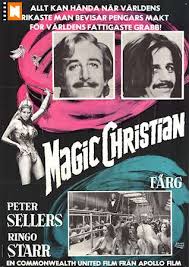
THE MAGIC CHRISTIAN
UK, 1969, 95 Minutes, Colour.
Peter Sellers, Ringo Starr, Richard Attenborough, Leonard Frey, Laurence Harvey, Christopher Lee, Spike Milligan, Yul Brynner, Roman Polanski, Raquel Welch, Isabel Jeans, Wilfred Hyde Whyte.
Directed by Joseph Mc Grath.
The Middle Ages had community 'Feast of Fools' where all, lay and clerical, shared in days of satire and the ridiculing of life and all conventions. Large sections of today's communities would be reluctant to approve such festivals and would question their good taste. Hence, boisterous film satires are usually classified objectionable. This happened to The Magic Christian (a ship!), based on Terry Sothern's book. It is outlandish English ridiculing of the way we all sell and degrade ourselves for money. Naturally, there are heavy-handed lapses of taste. Many will find the finale hard to take, but by and large, the usual areas of sex and violence are ignored and greed and hypocrisy become the targets. There are some hilarious and scathing sequences with Peter Sellers and Ringo Starr using Paul McCartney's message: "If you want it, here it is; come and get it for it's going fast.' And people do. It is extravagant satire. If you enjoy satire, you will like this.
1. The reputation of the novel, of Terry Southern as an iconoclastic satirist? The reputation of the film? The indications of the title and the strange juxtaposition of words and ideas?
2. Audience expectations of a film version of Terry Southern's work, from the title? The satire, the stars?
3. The impact and importance of satire, black comedy and the ability to ridicule, to laugh humorously, to laugh at? How much truth is told in satire, even with exaggeration? Oblique insight into human situations via satire? How applicable is this theory to this film?
4. The satire was particularly British. what particular aspects of Britain were satisfyingly satirised? Was universal satire applicable?
5. The tone of the credits with the Beatles' song, the style with the indication of how to sing the words, the tone of the song, the indication of the theme of money and greed? How did this tie in with the final sequence of people getting into the vat for the money? The satire of money and greed as a framework for the rest of the episode?
6. The character of Guy Grand? The irony of his being a grand guy? What did Peter Sellers bring to the characterization? Guy Grand and his role in society as eccentric, a megalomania of devilment, his attitude towards money and power, his tilting at nobility, business, everyone? How is this embodied in portraying the initial search for a son? The irony of Ringo Starr playing his son? The satire on the romantic finding of a son and heir? Their plotting together? Setting a tone of expectation of the satire to follow?
7. The portrayal of big business, multinationals, power and control? The satire in the persons on the board meetings, the conduct of the board meetings, Guy Grand's control, the wheeler-dealing and the attacks on it? Guy Grand Junior going into the meetings? An example of the upsetting of the establishment?
8. The satire in the presentation of the Guy Grand family: the various types, sisters, at home, travelling? The skits on their behaviour, especially their reaction to television violence? what aspects of middle-class and upper class self satisfaction were being attacked?
9. Comment on the effectiveness of the episodes in which Guy Grand and his son attacked the establishment and pricked the balloons of pomposity
a) the theatre-going and the production of Hamlet, the humour and the good taste of Laurence Harvey's striptease during the soliloquy? The irony of Junior's comments on and knowledge of Shakespeare? What was being satirised as regards the theatre world, theatre audiences?
b) Guy Grand and his pretending to be the gourmet at the restaurant, the satire on snobbery and greediness?
c) the sequence at Sotheby's, the people that go to auctions, their motivations, the people that run auctions, eg. the satire with John Cleese and Patrick Cargill and their types? Greed and status?
d) the satire on the ordinary man in the street, Spike Milligan's traffic warden, his being able to be corrupted, eating of the traffic ticket?
e) the satire on the Oxford crew and being able to be bribed, the irony of Richard Attenborough being the coach? The battle that ensued and the corrupt motives of all concerned?
f) the train sequences and travelling in style, the satire on this kind of first class travelling?
g) the hunting in the country and the war games. the satire on war and people's callous attitudes to this kind of game-playing?
h) the dog show and the panther destroying the dogs? i) which other sequences and episodes were most effective and what were they satirising?
10. The build up of atmosphere to the building of the magic Christian and its launching? Guy Grand's motives of having the cruise? The portrayal of the ship and its luxury, the snobbery of the people going on board? The humour of the captain and his ho-ho-ho attitude, his drinking, everything being out of control and the bland reassurances? The glimpses of satire on the ship, eg. Raquel Welch and the slave galley, the various passengers, Christopher Lee as a vampire, Yul Brynner as female singer, Roman Polanski as passenger? The growing chaos and the fact that they voyaged nowhere?
11. The importance of the final sequence with the vat. the repugnance, the ingredients being poured in and mixed, Guy Grand and his son watching on with content, the scattering of the money, the tentative approaches of people, their sinking of their pride for greed? What was the audience left with at the end?
12. The enjoyment and comedy value? The satiric barbs? Momentary effect? Permanent effect?
Published in Movie Reviews
Published in
Movie Reviews
Tagged under
Saturday, 18 September 2021 19:28
Magic
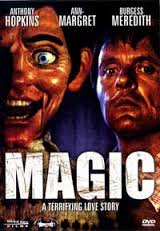
MAGIC
US, 1978, 107 Minutes, Colour.
Anthony Hopkins, Ann Margret, Burgess Meredith, Ed Lauter.
Directed by Richard Attenborough.
Magic is the story of the ventriloquist who so identifies with his dummy that he no longer controls it is not original but is always dramatically interesting and psychologically fascinating, a man dialoguing with the shadow side of his personality. Anthony Hopkins portrays Corky and his dummy Fats so well, especially in a scene where he shows he cannot function without his dummy conversing with him, that he keep the interest in this offbeat story of conventional triangle romance and murder. Too leisurely for the intense crime/horror it might have been, the film has its eerie moments, especially in the bawdy/violent conversations. Ann Margret and Burgess Meredith are both impressive. Unusual.
Magic and Anthony Hopkins' performance invite comparison with the classic performance by Michael Redgrave as the ventriloquist in Cavalcanti's Dead of Night.
1. The focus of the title, its impact? The explanation of magic, especially on the part of the magician and his sleight of hand, the eyes of the observers and what is noticed and not noticed? The appeal and fantasy of magic? The power of magic? Corky and his explanations of magic? Black and white magic? The difference between magic and tricks?
2. The old story of the identification of ventriloquist and dummy? How well was this old story used? Dramatised, the comedy aspects, the psychology? Transferred into the realm of romance, of the thriller, of the psychotic murder story? How well did each of these ingredients blend? The film was criticised strongly for being flat, lacking direction flair. Were these criticisms justified?
3. The irony of the romantic themes? Corky and his shyness, his relying on Fats? Peggy Ann and her liking for Corky? Duke and his brutality? The irony of their knowing one another when they were at school, growing older? The basic triangle theme and its presentation and use? The triangle theme with its murderous tones? Romance, shyness, compensation? The love as a possibility for the redemption and change of Corky, of Peggy Ann?
4. The film tradition of the psychotic schizophrenic murderer? The precedents and audience expectations? The dramatisation of psychotic behaviour? The use of the ventriloquist and dummy to illustrate symbolically and realistically the reality of the split personality? The questions of personality, control, responsibility? Who is it that acts? Fats seeming to act and his finally laying the blame on Corky and explaining it was his responsibility?
5. The importance of the ventriloquist's dummy? Made of wood, lifeless, artificial, painted? Yet it coming to life and having a personality of its own? An extension, alter ego of the ventriloquist? The lifeless being, alive? Fats and his looking like Corky? His manner of speaking? The way the film photographed the two of them together as two aspects of the one person? The irony of the symbol at the end of the wooden heart and its relationship to both Corky and Fats? The gift to Peggy Ann? The symbol of a lifeless heart? Its being visualised at the end?
6. The basic psychological themes of the ventriloquist and dummy: the dummy as the shadow figure of the person, the compensation, the vulgarity, crudeness, language, sexuality, violence, intelligence, control? Fats as an important extension and compensation for Corky who was so shy and fearful? The indications of the possibility of integrating personality? The feminine role and Corky's being influence by Peggy Ann? The possibility of his being healed and becoming a whole person? The power of Fats and his taking over and dominating? Only leaving control when he was about to die?
7. The personality of Corky ? as revealed in the introduction? His relationship with his teacher ? Merlin, with the magic overtones? His reporting back to Merlin and his words belying the reality shown us in the flashbacks? The humiliation of his failure, the significance of his lies as indicating the split in his personality? The insight into Corky that the audience had? How well did Corky understand his failure and his reporting this to Merlin? The tone of what was to follow?
8. How well did the film make the transition to his success? Showing this to us through the eyes of Harry and the invitation to the television executive? Harry and his smooth and smug confidence? The executive and his boredom? Corky and the audience fearing that he would repeat his failure performance? The sudden arrival of Fats, its unexpectedness, the language, the personality and the success of the magic tricks? What need did Corky have for Fats for success? The build-up to the question of contracts, Corky wanting to fulfil them, the problem of the medical test and the crisis that it made?
9. Burgess Meredith's performance as Harry? The embodiment of the American entrepreneur, his style, manner, clothes, car and his devotion to it? A tough man, the bond with Corky, the promise of the meal? The long negotiations with the executives? The importance of the medical test and Harry's suspicions? His response to Corky's escape? His deciding to visit, taking a tough line? The inevitability of his death? The ugliness and violence of his death, the shock value of its slowness and the audience thinking that he was dead when he was not? The irony and ludicrous aspects of his body being in the river, the fishing hook and then the ironic discovery of his body on the shore? The questions of his car? A rounded characterization as well as the contribution to the thriller plot?
10. Corky and his response to success, the build-up of his fears? His escaping to the country, the explanation of himself to the taxi driver? The first encounter with Peggy Ann and their both thinking they were not recognised? The link with Peggy Ann, the memories, the stories? His falling in love? The importance of the consummation and Fats being present? The audience's ambiguous attitude in its response to Corky with Peggy Ann and Fats and his jealousy? The repercussions for Corky and the possibility of his running away with Peggy Ann and succeeding in life? The repercussions on her to make a decision about her marriage, her emotions, affirming Corky? The repercussions of Fats and his growing jealousy and violence? The shadow side of Corky that could not accept the integration of healing and fought against it? The repercussion for Duke and the inevitability of his death?
11. Ann Margret's portrayal of Peggy? Her place in the motel, her life up to middle-age, her worn aspects, her warm personality? The shared experience and memories with Corky? Her falling in love with him? The decisions? Her behaviour when Duke was present? Her not wanting to hurt him? Her decision to go and Fats revealing the trick and debasing her emotions? Her danger in being the murder victim? The symbolism of the wooden heart and Corky giving his life for her and for her to live?
12. The character of Duke, the build-up before his arrival, Peggy Ann's talking about him, his reputation at school, the years that she shared with him, his work and the lies about this? A jealous and violent man? Friendship with Corky? The fishing expedition and the effect on Corky, especially with the discovery of the body? The mounting tension during this? The suspicions of Duke and his examining his house, the inevitability of his death, the violence of Fats stabbing him? Corky's burying him?
Published in Movie Reviews
Published in
Movie Reviews
Tagged under
Saturday, 18 September 2021 19:28
Mafia Princess
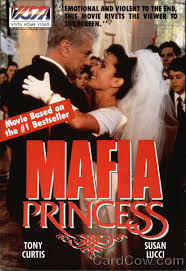
MAFIA PRINCESS
US, 1986, 100 minutes, Colour.
Tony Curtis, Susan Lucci, Kathleen Widdoes.
Directed by Robert Collins.
Mafia Princess is an entertaining telemovie based on a true story. It was co written by Antoinette Giancana about her father as well as about herself. Sam Giancana was assassinated in Chicago after many years as the head of the Mafia in that city.
The film is related to The Godfather and other Mafia films. It relates in theme to Prizzi's Honour as well as the more comic style of Married to the Mob.
Susan Lucci portrays Annette Giancana. But the film belongs to Tony Curtis who is quite effective as Sam Giancana, a proud man who cannot express love for his daughter. (Curtis had portrayed the Jewish gangster Lepke in 1973.) Kathleen Widdoes is very good as the wife and mother.
The action is seen from the perspective of Annette, so we don't see a great deal of Mafia business. However, it gives something of a human face to the presence of the Mafia in American cities.
1. Telemovie treatment of the Mafia? Chicago? Based on a true story?
2. Chicago in its period? Hollywood? Musical score ? and echoes of Italian melodies?
3. The introduction to Sam and Annette, their clash, the FBI surveillance, the flashbacks?
4. Annette as a Mafia princess: the day she was born, her father wanting her to be a nun, her mother's joy, the father's joy but his never being able to show it to her? Her growing up, Annette as a little girl, having everything she wanted, clever, opening the door in the hotel and her father's outburst of anger, her breaking the statue and her father hitting her?
5. Her father going away to college and her not knowing what was happening? Her wanting to be her father's daughter but his distance? Her reliance on her mother? Going to boarding school, unwillingness, kicking the nun? Growing up? Her father paying donations to enable her to stay? As an adult, confused values, wanting to go to Hollywood, her poor dramatic skills and the lessons, the executives helping her because of her father, her modelling the swimwear, changing her name to Toni Jordan? In love with the sailor, his sudden departure, her going to Wilmington and his rejection of her because of her father? Meeting the doctor? The abortion? The marriage, Sammy’s attitude towards the sacrilege and divorce? Her drinking, going downhill? Her mother's death and her father blaming her? The FBI surveillance, her anger, yet love for her father? Her 40th birthday and the invitation? The premonition of his death? Her anger at the funeral? The information about the aftermath and her writing the book? The guest spot in the film?
6. Tony Curtis's portrait of Sam Giancana: the senate inquiries, a Mob boss, his ordinary start, work, the birth of his daughter and his friends, his angers towards his daughter? Moonshine and arrest? Jail, the confrontation with the black gang leader with the numbers, the killing plan (and Annette overhearing)? His henchmen, running things from jail, his power? Relationship with his wife, fidelity and infidelity? Pride in his daughter but coldness towards her? Wanting her to be a nun, not wanting her to be an actress? The audience seeing Sam through the eyes of Annette? Paying the school, his wealth, absence, Hollywood personalities and their fear of him and helping his daughter? His wife's death and blaming Annette? The distance between the two, her growing older, at home, the bond with his servant? His reminiscing about his fidelity to the Family and his being shot?
7. The sketch of his wife: love for her husband, as a mother, knowing what was happening, comforting her daughter, the boarding school, meals for the Mob, going to Hollywood, helping her daughter with the swimwear, her outburst of anger and her death?
8. The henchmen, the servant and the close relationship? The background of the Mob, assassinations?
9. Hollywood and his exercising of pressure, on the sailor, on the doctor?
10. The code of the Mafia: business, morality? evil? The victims? The Catholic and Italian backgrounds?
11. The effect of this experience on Annette, her memories, exorcising her memories?
Published in Movie Reviews
Published in
Movie Reviews
Tagged under
Saturday, 18 September 2021 19:28
Mae West
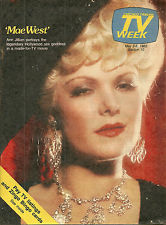
MAE WEST
US, 1982, 95 minutes, Colour.
Anne Jillian, James Brolin, Piper Laurie, Roddy Mc Dowall, Chuck Mc Cann.
Directed by Lee Phillips.
Mae West is one of the many biographical films that came out in the 1970s and 1980s, going back into the cinema of the 1930s and 1940s. Biographies included those of Gable and Lombard, W.C. Fields.
Anne Jillian does an impersonation of Mae West. James Brolin is her husband. Piper Laurie is her show business forceful mother and Roddy McDowall? is a drag queen.
The film shows the life and pressures on West. It also shows her career on Broadway – and her imprisonment for ten days for indecency during the 1920s. While she had a successful career in Hollywood, her films clashed with the standards of the Hayes code and gave her a certain notoriety. She starred several times with Cary Grant and with W.C. Fields (and there are glimpses of these films here).
Mae West was famous for her name being used for the lifesaver for the forces during World War Two. She wrote a number of plays – always strong on innuendo and risqué lines, many of which are very funny. In her later life she appeared – to her disadvantage – in Myra Breckenridge with Raquel Welch and a terrible parody of her life and style in Sextette in 1978.
1. An entertaining telemovie? Enjoyment, interest? Impact? Impression of the celebrity actress?
2. The film's style: re-creation of period, a piece of Americana, the background of burlesque, theatre, Hollywood, Broadway? Contribution of songs, score, choreography?
3. The structure of the film: the focus on Mae West and the court case, the flashbacks, the moving forward from halfway through the film?
4. Mae West in retrospect: her skill in burlesque, the focus on sexuality and her frankness, humour and sexuality, her one liners, the quality of her films and performances, her writing? Her being a celebrity in World War Two? Sex symbol? The sadness of her later career (Myra Breckenridge and Sextet not mentioned in the film?) Her role as a symbol of America?
5. The focus on controversy and its impact, the police, the judge, the court? The issues? The effect on her ? as brassy as she sounded?
6. Her memories: her father and his boorishness, ridicule, harshness and change? Her mother and her support, training? Her mother living vicariously through her daughter? Her being a burlesque moppet? Her growing older, adolescent problems, relationship with boys, her mother's advice ? the permissive touch and Mae following it?
7. Her success at burlesque, her oomph style? Her discovering that she was style-less? The types in burlesque? The friendship with Frank Wallace, dancing with him? The irony of marrying him ? and her even forgetting it? The buying off of her contract, leaving Frank, her success?
8. Jim and the call, meeting, the infatuation, dinner, affluence? Her becoming his mistress? His becoming her manager? Toughness, her goals, Hollywood, Paramount Studios and the tantrum, her refusal to marry Jim, his being hurt, their continued contact over the years, his illness and her coming to him at the end? His loving her, protecting her? Loneliness?
9. Roddy McDowall's performance as the female impersonator? The style of his performances? His impact on Mae? His help, discussions about style, changing her appearance, coaching her, managing her? His advice for her to be an original? His character in himself? Relationship with Mae?
10. The transition from burlesque to theatre: songs, bawdiness, realism? Her mannerisms? Her developing her style to become an original?
11. The play, the director, the arrest, the court case? Jail and the warden infatuated with her? The importance of the newspaper reporter and his continued needling of her? His interviews? His presence in the theatre at the end and his applause?
12. Mae's cinema career: the clashes with Archie Mayo, with George Raft? Her writing her lines? Her encouraging Cary Grant in his career? Her being a box office success? The clash with W.C. Fields? The poor later films?
13. Her comeback on Broadway and its spectacular success, her acclaim? Her personal loneliness?
14. Audience knowledge of her later old age and career ? did her earlier life explain her later decay? Her being acclaimed despite her living too long?
15. An enjoyable portrayal of an original? Images of a period in American entertainment? Insight into theatre and star personalities?
Published in Movie Reviews
Published in
Movie Reviews
Tagged under
Saturday, 18 September 2021 19:28
Mad Miss Manton, The
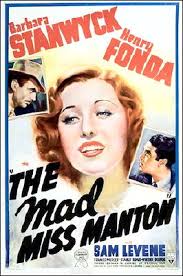
THE MAD MISS MANTON
US, 1938, 80 minutes, Black and white.
Barbara Stanwyck, Henry Fonda, Sam Levene, Frances Mercer, Stanley Ridges, Hattie McDaniell?, Miles Mander.
Directed by Leigh Jason.
The Mad Miss Manton is a minor, second feature R.K.O. film of the late '30s. It draws together the madcap screwball comedy styles of the time with a murder mystery. It is brief, relies on the impact of its stars and the curiosity of the murders. It is also, in post Depression times, a criticism of the flighty and silly wealthy. Barbara Stanwyck is in her element as the socialite who sees a murder and whom the police will not believe. Henry Fonda is his usual self as the sceptical police officer. They were soon to appear to great advantage in Preston Sturges' The Lady Eve. Small, entertaining but a forgettable example of the style of filmmaking of the '30s.
Published in Movie Reviews
Published in
Movie Reviews
Tagged under
Saturday, 18 September 2021 19:28
Mad Magician, The
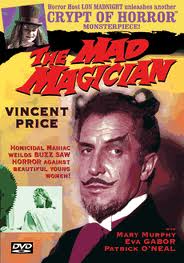
THE MAD MAGICIAN
US, 1954, 72 minutes, Black and white.
Vincent Price, Mary Murphy, Eva Gabor, Patrick O’ Neal.
Directed by John Brahm.
The Mad Magician is an early Vincent Price horror film, made after his House of Wax. As usual, he is elegant and eloquent, especially while insane
Filmed in 3D and black and white, film obviously still has some sequences for poking things at its audience. However, it is an entertaining thriller with Price as an inventive magician whose creations are used by others. He attempts to go public and eventually has to kill people, then cover up his murders. He plays in rather low key fashion and this makes his performance more credible. Eva Gabor appears briefly as his wife. The romantic leads are Mary Murphy and a very young Patrick O'Neill. There are some amusing minor characters, better drawn than usual. There is a turn of the century period setting and direction is by veteran John Brown.
1. Enjoyable horror, murder thriller?
2. Black and, white photography, turn of the century period decor and costumes? The design of sequences for 3D effects? Musical score?
3. The title and its focus on Don Gallico? His skills as an inventor, his ambitions to be a performer? The thwarting of his ambitions? His turning murderous? His ingenuity in his killings? The final confrontation, his comment on his own madness?
4. Vincent Price's style as Gallico? His performing on the stage, his nervousness? His mimicking other magicians? The stopping of the show? The businessman and his power over Gallico, taking his wife, owning his creations? Gallico's vengeance? Friendship with Bruce, friendship with Karen? Clare and her return, fickle? His killing of the entrepreneur, concealing his body, burning it on the bonfire? His mask and assuming his identity, persuading the Prentices to believe him? His killing of Clare after her discovery? His confrontation with Rinaldo, Rinaldo's blackmail and his killing him? His further madness, taking Rinaldo's place, the confrontation about the fingerprints? The final threats, the carriage ride, the confrontation with Bruce? The crematorium? His own death? A mad magician for this kind of small thriller?
5. Bruce and the police, his skill in investigation, knowledge of fingerprints, his confrontation of Rinaldo? The final fight with Gallico, on the crematorium slide, the rescue? Karen as heroine, her assistance of Gallico, liking for him, attraction for Bruce, her phone call and revealing the truth? The final drama?
6. The entrepreneur and his callous closing of the show, his hold over Gallico, his use of Clare? His beheading? Gallico taking his place and suspicions that he was the murderer? Rinaldo and his style, pretensions? His attempt at blackmail? His being killed in the crematorium?
6, Alice Prentice and Frank? Frank and his being a yes-man to Alice? Alice and her skills as a writer, imagination, involved in the search, her detection and clues, her realising the truth? Her participation in the finale?
8. A popular thriller? Themes of sanity and madness, trickery, power and money, betrayal, good and evil?
Published in Movie Reviews
Published in
Movie Reviews
Tagged under
Saturday, 18 September 2021 19:28
Madman
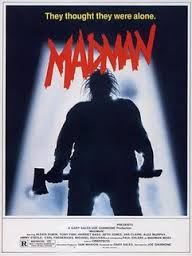
MADMAN
US, 1982, 88 minutes, Colour.
Directed by Joe Giannone.
Madman is yet another Halloween derivative. It resembles very closely Friday the 13th which set a pattern of the terrorising of a group of youngsters, especially at a holiday camp in charge of children. The most blatant imitation
was Tony Maylem's The Burning. Madman resembles The Burning very closely, even in plot details. However, it begins better with eerie stories told around the campfire in a type of chanting style and the film fulfilling the story. The characters are somewhat better delineated than in the usual Friday the 13th imitation. However, the madman is presented as a monster, the victims are most gorily despatched and, in this film, without mercy. The films of the early 1980s imitating Friday the 13th seem either exploitative ghastly entertainment or exercises in film techniques and special effects by student filmmakers - or both.
Published in Movie Reviews
Published in
Movie Reviews
Tagged under
Saturday, 18 September 2021 19:28
Madame X/ 1965
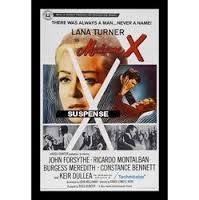
MADAME X
US, 1965, 100 minutes, Colour.
Lana Turner, John Forsythe, Ricardo Montalban, Constance Bennett, Burgess Meredith, Keir Dullea, Virginia Grey, Warren Stevens.
Directed by David Lowell Rich.
Madame X was originally a stage melodrama with an emotional and sentimental impact that earned the name 'tearjerker'. It has been film several times: with Ruth Chatterton, Gladys George, then Lana Turner and a television remake with Tuesday Weld. It is easy to criticise this kind of contrived melodrama with all stops out. Nevertheless, it touches so many basic emotions, husband and wife, career, measuring up to standards: class antipathy, fall from grace, degradation, integrity in weakness, refusal to betray, motherly love, death ? that it has a perennial popularity. It aims at an emotional response and gets it.
This version is given the lavish Universal Studios touch by producer Ross Hunter (Magnificent Obsession and the Jane Wyman/Rock Hudson films, many of Douglas Sirk's melodramas with Lana Turner etc.). Lana Turner acts well towards the end of a successful quarter century of filmmaking. She has the Hollywood type glamour to carry the role. John Forsythe is somewhat stolid in an underwritten role and it is the character actors, Constance Bennett, Burgess Meredith, who have the best parts. Keir Dullea, in an early role, is persuasive as the sensitive lawyer son.
Direction is by David Lowell Rich who directed many competent entertainments and telemovies for Universal over several decades. Easy to criticise, but an emotionally enjoyable wallow nonetheless.
1. The appeal of soap opera? Emotional situations, characters is relation to emotional situations, crises and tragedies? Perennial themes and response? The film as an old-fashioned melodramatic play, filmed many times? The reason for its continued appeal?
2. Ross Hunter and his lavish and glossy production values? The soap operas of the '60s? Colour photography, affluent society, political background (in the immediate post-Kennedy era), society,, Connecticut, Europe? The lush treatment? The contrast with Mexican decadence, also given the lush treatment? A vehicle for Lana Turner, her hair and gowns etc.? The romantic score? A technically competent soap opera?
3. The conventional material and characterisations, audience expectations of characters and themes. sympathies? The heroine becoming victim, her fall, pain, suffering? The importance of coincidences and the heightening of drama to melodrama? The emotional ironies, especially at the end with her son defending Madame X?
4. The melodramatic title. the element of mystery? Lana Turner and her ability to sustain the role? The younger Holly and her marriage, love for her husband, delight in her new home, fitting into society, newspaper reports, the birth of Clay Jnr, her role as mother? The relationship with Estelle and her implied criticism? Christmas sequences and decorations and angels? Clay's absences and her having to cope? Her friendship with Phil? How persuasive was her loneliness? Her going out, enjoying Phil’s company? The implications of the affair, without their being visualised? The screenplay's building up pressure? Clay's return home? The appointment to Washington? The possibility of a house? Holly's finally going out with Phil, the accident and her cover up? Estelle having her followed? The possibility of a happy future and Estelle's destroying it? The phone call to Clay and Holly's composure? Farewell to her son? The arrangement of the disappearance? Audience involvement with her suffering?
5. Holly as victim, Europe, mistaking the child in the street, changing her hair and appearance, seeing the information about her disappearance in the paper, her letting herself die? The rescue, her recovery, the kindness of Christian, her recovery, the proposal and her decision to go away?
6. Mexico, the sleazy atmosphere, picking up men, the addiction to absinthe, the encounter with Danny Sullivan, her telling her story, wanting to backtrack when sober, his hatching his plot, persuading her to go to New York, her overhearing his plan and her spoiling the plan by pretending he had put her up to it, sending him off and shooting him? The emotional draining ? her confessing and signing her name as 'X'?
7. The irony about her son defending her? The audience knowing it and Holly not knowing it? The court case and her impassivity in the cell with the interview with Clay, her behaviour in the court, her growing more desperate, the court spinning and her collapse? Her encountering Clay and her realising the truth? The importance of her speech and her principles of not betraying her son given to the jury? Clay Jnr seeing her in the cell and her bequest for him to be happy? Her death? Guilt, responsibility, love and self sacrifice, her finally being recompensed?
8. Estelle as mother? an inverted Holly? Each mother protecting her child? Estelle and her snobbery, ambitions for her son, watching Holly, setting a detective on her, her cruelty, the plan, the financial support? Her son's career? Her reaction at the trial?
9. Clay as conventional hero: the marriage, busy with his career, his neglecting Holly, the plans for Washington? The impact of his son's performance in court, realisation about Holly, wanting to see her, the repercussions of the truth?
10. Clay Jnr and his success in court, interviewing Madame X, his performance during the trial, plea to the jury, listening to her final speech, speaking to her in the cell? Her bequest to him?
11. Danny Sullivan as evil, listening to Holly, the plan, his contacts, the record read out in court, his meriting Holly shooting him?
12. Phil as the smooth-talking playboy and the comment on high society?
13. Christian and his kindness?
14. The American dream, its being spoilt? Clashes of class and expectations? What doth it profit to lose the world?
15. Classy soap opera? Audiences being critical of soap opera conventions, yet being in touch with the sentiments and enjoying a wallow in such stories?
Published in Movie Reviews
Published in
Movie Reviews
Tagged under
Saturday, 18 September 2021 19:28
Madame Rosa
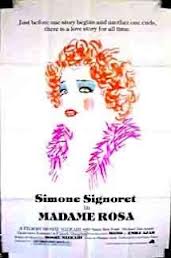
MADAME ROSA.
France, 1977, 120 Minutes, Colour.
Simone Signoret, Claude Dauphin, Samy Ben Youb, Gabriel Jabbour.
Directed by Moshe Mizrahi.
Oscar, Best Foreign Film, 1977, perhaps indicating a move towards sentiment and hope, this generally gentle, painful story concerns an old prostitute, Jewish with memories of Auschwitz, a Muslim Algerian boy, son of pimp and prostitute in the racial melting pot of Paris. It is concerned with love, family, deep needs, illness and death. Simone Signoret's commanding presence gives the film great strength, especially in the unflinching treatment of the themes of ageing, ugliness, the presence or absence of God and death. The film is also a symbol of Jewish- Arab harmony, one feels that the audience's being immersed in this sometimes sordid, often loving, world, is a Gospel kind of experience.
1. The success of the film as popular entertainment? For French audiences, Jewish, Arab audiences? International? Its receiving the Oscar as the Best Foreign Film? Indication of the tempo and tone of the 70s?
2. The quality of Simone Signoret's presence and performance? How much did the success of the film rely on her?
3. The conventional material in the story ? the story of the ageing prostitute with the heart of gold, the prostitute type in France? Her Jewish background and Auschwitz? Children, the bond between an old woman and a young boy? How authentically were these conventional themes treated, with realism, with sentiment, appropriate?
4. The appeal of the young boy, the boy without parents, the boy seeking a substitute mother, the emotions in a young boy at the verge of puberty? The seeing of Madame Rosa through his eyes and his pain and love?
5. The French atmosphere of the film, the atmosphere of the presentation of French prostitutes on the screen, the sympathetic presentation? The background of the war, concentration camps, Paris in the 70s? Paris as an international melting pot?
6. The background of Jewish-Arab? relationships and hostilities? The bonding of the two in this film? Jewish-Arab? and religious background, political implications, social implications?
7. Paris as the setting, its streets, tenements, shops? The Jewish section? The prostitutes and their world? The amalgam of the races, black and white, Algerians?
8. The introduction to Madame Rosa and the constant use of this title, also for Madame Lola? Catching her in the street returning from shopping, the people greeting her and her popularity, her strength to climb the stairs, the welcoming of people in the apartment, the snubbing of the old man who was dying, the collage of the children and their love and attention to Madame Rosa? The situation of her caring for the children? The introduction to Momo and his closeness to Madame Rosa and her relying on him? The rest of the film as illustrating the bond between the two?
9. The information about her house, living there for twenty years, the sixth floor, the ageing prostitute retired and looking after prostitutes' children? The cheques supporting her? The visits of the parents? The meals and their living together, her educating them, respecting their background culture and religion? Keeping the secrets of their origins? True and false documents? Her being a mother to these children and their need for a substitute mother? The need for love in their lives? The comments made throughout the film on the children of prostitutes?
10. The film's portrayal of the people in the apartment block: the Algerians and their help, bringing the doctor, Madame Lola and her giving money, her kindness (the explanation of her boxing background), the old man who seemed to snub her and then paid her a visit and brought her flowers when she was well, the impact of his death and the ambulance coming? People's willingness to help her?
11. The film's drawing of the character of Madame Rosa: her age, her work, the significance of her life and her memories, her pride, her lover who betrayed her, memories of Auschwitz and their repercussions on suffering, her attitude towards God? The importance of her Jewish hideaway and her going there during the night, Momo taking her there to die, her wanting to pray there? Her illness, fear of cancer, overeating, the turns that she had, the affecting of her brain? The significance of her phobia about hospitals, her discussions with Dr. Katz? The visuals of her illness, her spasms? The imagination of the S.S. coming to get her? Her being ill in bed and people looking after her, especially Madame Lola? Seeing her in her hideaway as an old woman?
12. Her standards of good and evil, of right and wrong, of honour, of values? Her lies to Momo to protect him, to keep him, lowering his age? Her sincerity about the children, bringing them up? The importance of Momo in her life, as her child, relying on him? For her death?
13. Dr Katz as sympathetic? Her worry about Momo with him? The background of his father's visit? Momo finding out about her illness from Dr Katz? His telling the lies about the trip to Israel at the end?
14. How important was the portrayal of Momo? A sympathetic boy? His place in the house? His wandering the streets, his act with his umbrella ? and his explanation of this to Ramon and Nadine? His walking the little boy down the street and stealing? The wanting the dog and the stealing of it? His motivation for selling it so suddenly and getting rid of the money? Madame Rosa's reaction and yet her tearing up his money solicited from the kindly prostitute? The importance of his encounter with Nadine and their conversation, his following her and the repercussions for his life? The importance of his father's visit? Madame Rosa's technique of getting him to tell the truth so that Momo would hear? Her decision to pretend that Momo was not his son? The violence of Momo's parents' background ? the father the pimp, the mother the prostitute, her death, his being in the mental institution, the shock to his system about his son's religion and his death ? and the Algerians putting him on the stairs? The effect on Momo of knowing about his family?
15. The theme of the friendship with Nadine, her working in the film editing office and running things backwards and its effect on him and his desire for life to start again? Her home, her children and their initial attitude, their asking him to stay at the end? Ramon and his kindliness? The taping of his story and the repercussions of this at the end with the further taping of the story? Their address so that he did have friends after Madame Rosa's death?
16. The importance of the character of Monsieur Hamill? his age, Islamic tradition, his wisdom, his advice, his teach Momo, his age and his calling him Victor? Eliciting compassionate love from Momo? His comment that man could not live without love?
17. The build-up to Madame Rosa's death? Momo's Israel story, taking her downstairs, preparing her for her death in her hideaway and its appropriateness? The manner of her dying, her wishing it, facing it? The candles and her death? His getting the make up, his wanting to die with her but the practicalities of the smell and people breaking in? His having to come out of this tomb and live his life?
18. How valuable an exploration of human relationships?
Published in Movie Reviews
Published in
Movie Reviews
Tagged under
Saturday, 18 September 2021 19:28
Madame Bovary/ 1949
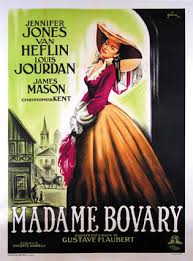
MADAME BOVARY
US, 1949, 114 minutes, Black and white.
Jennifer Jones, Van Heflin, James Mason, Louis Jourdan, Christopher Kent, Gene Lockhart, Gladys Cooper, John
Abbott, George Zucco.
Directed by Vincente Minnelli.
Madame Bovary is a sumptuous M.G.M. presentation of Gustav Flaubert's novel (as well as a court case trying him for indecency in his writing). The novel's essence is presented but given the framework of moralising by the court case. The production was directed by Vincente Minnelli, who made many musicals including Meet Me In St. Louis and many melodramas. There is an excellent cast with Jennifer Jones attractive, Van Heflin effective as her dull husband. There is an effective performance by Swedish director Alf Kjellin (who was renamed Christopher Kent for this film). There is an excellent M.G.M. supporting cast. This 19th. century material is very reminiscent of such novels as Tolstoy's Anna Karenina.
1. The status of Flaubert's novel? In its day? Criticisms about its morals? Stances of 19th. century authors in terms of psychological understanding, freedom of expression, portrayal of the truth?
2. The prologue about Flaubert's trial? Its style? The attack on the author, eliciting audience sympathies, eliciting audience views?' The device of introducing the author himself, his trial? His telling the story ? inviting us to watch Madame Bovary, distancing us from complete involvement by his voiceover commentary? The end and his vindication? The portrait of Flaubert by James Mason?
3. The structure of the film: the effect of the Flaubert framework, the selection of episodes, the presentation of Emma Bovary's situations. the moralising voiceover? The focus on the characters in the light of Flaubert's views?
4. M.G.M. production values? Black and white photography. period settings, decor? The abilities of the director? The cast? Miklos Rosza and his epic style score? Camera techniques e.g. the movement at the ball sequence?
5. The impact of 19th. century classic novels: portraits of society. written in times prior to psychological vocabulary? Insight into psychology? Using rounded characters as well as stereotypes, patterns of behaviour. presentation of traditions and the breaking of traditions. moral expectations and taboos? The severity of moral judgment in public? Nineteenth century hypocrisies? The contrast with alleged 20th. century freedoms?
6. Emma's situation: life in the countryside of France. the 19th. century isolation, lack of communication? Life on the farm? Emma and her father? Her attraction towards any man, throwing herself at Charles e.g. the dress, talk at breakfast? The flashbacks for Emma and her past: boarding school. the strict regime of the nuns, the surreptitious reading of novels, popular love songs filling her imagination? Flaubert's comment on Emma and her romantic and unreal view of the world? Her inability to accept the humdrum and to be at ease with ordinary life? His blaming of society for these romantic attitudes?
7. Charles' planning at the house, proposal? The wedding and Emma's gentility contrasting with the coarseness of the French people? The escape from the party? The home? Leon and his helping with the beautifying of the house? Emma's hope that the house would be beautiful and the irony of her saying this at the end? The prospects for a successful marriage?
8. Flaubert's comments on Charles Bovary and his ordinariness? As a doctor, his love for Emma, supporting her? Spoiling her with money and her whims? The party and his thinking it a success. her distress? His coping with Emma? The birth of the daughter? The disappointment for Emma? The invitation to the ball, his being out of place. drinking, making a scene? His continuing about his work and ignoring Emma's affairs? His being victim of her vivacity? His continued love? Her leaving and his forgiving her, the illness, the opera? His father's death? His helping Emma die? His continued devotion? The daughter and her crying at Emma's presence? Her final laughter? The final wandering of father and daughter? The best aspects of human loving?
9. Emma and her love for Charles? An escape from the farm? Her knowing that he loved her? Indications that the marriage would break, her beauty, dress, extravagance, having to have everything, borrowing money? Her upset at the boring party and with Leon's recitation? Her wanting a child and disappointment with having a girl? Her feeling that girls were doomed to be imprisoned by society? The ball and the infatuation with Rudolf? Her being the belle of the ball? The exhilaration of the dances? The attention? The encounter with Leon and the possibility of an affair but her rejecting it? Leon's mother lecturing her? The infatuation with Rudolf after the chance encounters, riding, spending so much time? Planning to go away? The gossip in the town? Her borrowing money and becoming a slave to debt? The impact of her being abandoned and the coach going past? her illness? The visit to the opera, meting Leon again? His pretending ~ and their affair? The debts and the pressure of the collector? Legal manoeuvring, the week with Leon, the truth about the estate? Leon telling the truth and her accepting it? Rudolf and her humiliation of herself ? and his refusing to give her the money? The taking of the poison ? her death? A victim of society, a victim of her impulses? Beloved by husband and daughter? The varying reactions of the people in her life and the way these were shown? How evil a woman was Emma? In the6ry, in practice?
10. The sketch of Leon and his work as a lawyer, buying the house. wanting a liaison with Emma, under his mother's influence, his lack of success in Paris, his pretending, the affair., the truth? Rudolf as the wealthy man not wanting to be committed, the dances and the riding, the glamour of the talking, his promises, his fear of Emma. his final refusal to help her?
11. The moneylender and his sinister presence, persuasiveness, the consequences of his hold over her ? the visits to her house, mortgaging her house, demanding his debts?
12. The picture of the town - 9 o'clock on an ordinary day? Life in the provinces and its boredom and humdrum? The attraction of Rouen? People, shops, daily business? Rouen and the hotels, cafes, the opera?
13. A picture of 19th. century life? Its impact in the '40s, now? Themes of human nature, standards, and Emma's being blessed by the Church, at her death? The importance of writers like Flaubert breaking through in portraying human nature and its good and evil?
Published in Movie Reviews
Published in
Movie Reviews
Tagged under